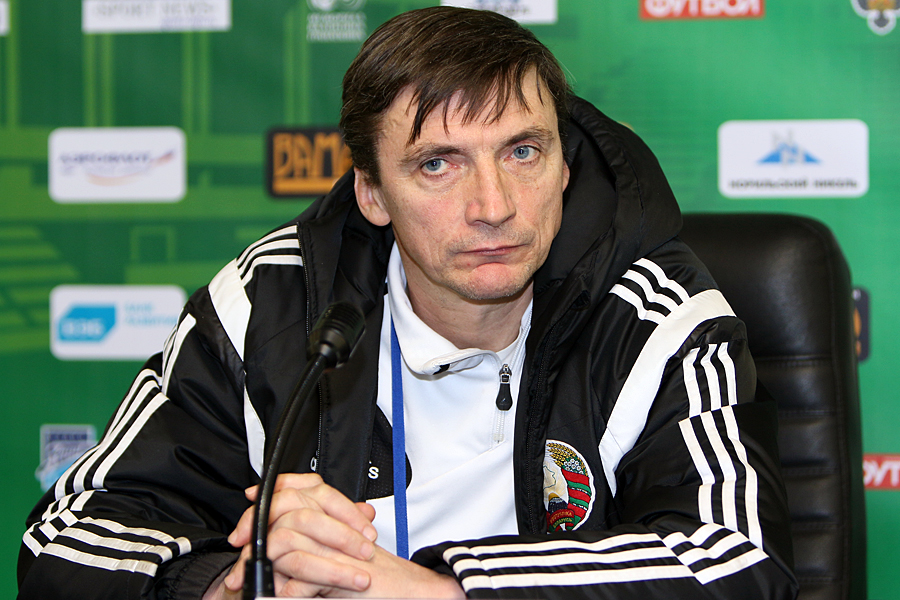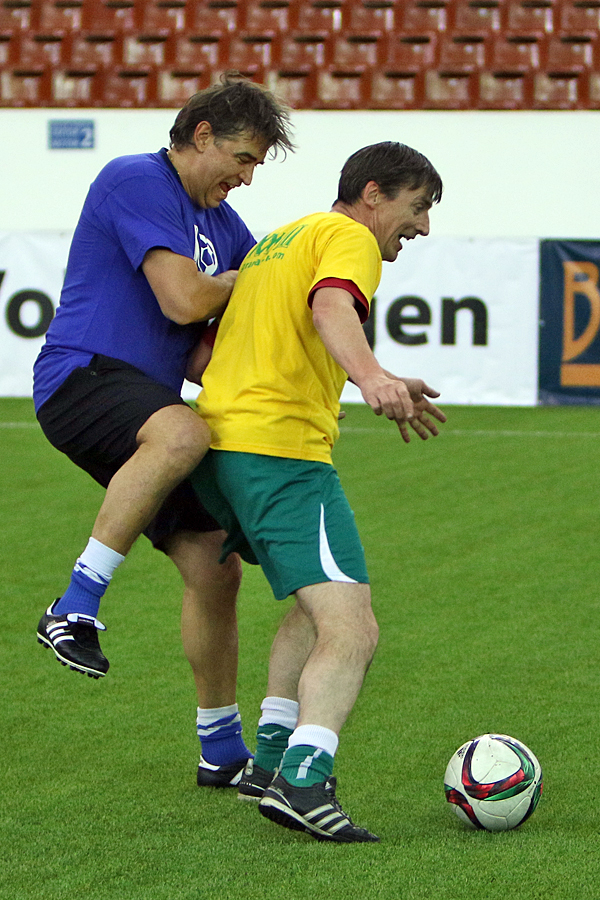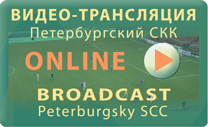
One of the most spectacular teams on the XXVIII Valentin Granatkin Memorial is U-18 team from Belarus. It scored five goals in the two starting matches (although conceded quite a lot as well – four). And you will not be surprised that the team is striving to play combinations and attack a lot once you find out they are coached by Mikhail Markhel, one of the brightest goal-scorer in Belarus football.
His best career season Markhel showed playing for the club other than his native Dinamo Minsk. It was Spartak Vladikavkaz (further renamed to Alaniya) in Russian Championship 1993 where he shined. Markhel scored 14 goals in that tournament just like his partner Nazim Souleimanov. Both strikers from that Vladikavkaz team made it to the Championship top-6 scorers. They had ahead only Panchenko, Veretennikov, Beschastnykh and Simutenkov.
It seemed the Markhel-Souleimanov duo would "make much noise" in the opponents' penalty areas. But... Markhel left Vladikavkaz after a year, and with this he cut himself of the chance to become a Champion of Russia in 1995 (unlike Souleimanov, for instance). And this made an interview with this outstanding forward and the acting Belarus head coach more interesting, for the discussion topics embraced not only current developments of the Granatkin Memorial, but also the old times.
– Mikhail, how did it happen that you went from Belarus to Vladikavkaz before such a successful Russian Championship of 1993?
– This was not a direct way (smiling). The last three USSR championships I played for Dinamo Minsk, the team that was adored not only by my native city, but by the entire Republic. Then the USSR ceased to exist and difficult times began when you had to earn your living and support your family. At first I got a chance to go to play in Yugoslavia, and I took it. And I gratefully recall that year and a half in Buduchnost Titograd team. It was still the Championship of Yugoslavia, a very tough tournament. But first Bosnian clubs left the ongoing championship and then a war began in Yugoslavia, so that people could not even think about football...
Shortly after I got into Nyiregyhaza, the club from Hungary, and this is where I had the most problems adapting. It was tough, especially with the language, for the Hungarian is awfully difficult and there's no chance you can learn it during half a year. So I went back home to Minsk. It was Ali Alchagirov, a friend I made playing for Dinamo Minsk (our wives were best friends, by the way), who raised a topic about Vladikavkaz and said "If you are free, then I can talk to the guys in the club and I think they can take you". Spartak was on training in Kislovodsk already. I went to their training camp alone and managed to get along with the teammates right away. The very first year we became the club top scorers together with Souleimanov.
– Who was the best assistant for you in that Spartak? Yanovsky? Or maybe Isayev?
– Everyone was helping. We had a great team, both as players and as human beings. Isayev was skillful with free kicks and corner kicks and I used this well near the opposite goals (smiling). And with Souleimanov it took us a short time to learn to understand each other without words.
– You left the team after the second season in Vladikavkaz. And if you had stayed you would have become a Champion of Russia...
– Yes. Gazzayev offered me to stay. But there was one circumstance... I had already promised Valentin Ivanov to join his Torpedo. I could not take my word back...
– Unfortunately, you played and you scored less in Torpedo than the Moscow fans expected of you.
– Injuries were the reason. That season was horrible for me as I had three surgeries throughout one calendar year. Meniscus tears. That's why I was unable to show my best in Chernomorets Novorossiisk in the next championship. I desperately did not want to quit big football so early being only 30. I was training through pain, but... My knee cartilages became very thin, and I had to have pain-relieving injections and the liquid sucked out all the time. So I just had to stop playing. But I did not leave football behind having morally started to prepare myself to become a coach already in Vladikavkaz, when I gradually got into analyzing the training process of Gazzayev.
– You have a big experience working with professional teams of Belarus. Which one of them are you recalling particularly warmly?
– The first "trial" coaching experience in Zvezda BGU was important for me. I wanted to show my best and I managed. First, we got to avoid relegation from division one, and then we got promoted to the upper division. Believe me, it was a huge event for Zvezda BGU. It was going well in Dinamo Brest, but... The club management lacked patience and the ambitions were too high. I don't have pretensions about this, since it's the coach's fate in the end.
– You are preparing young promising players for adult football now. Is it interesting?
– It's very interesting. You are watching the guys getting older, smarter and mature (in a football sense of these words). And you realize that you invested your own effort into this, which is very pleasant. The big football has completely different relations, including "monetary" (smiling).
– You are an ex-striker. Would you confess to us if you have a special treatment for your attacking players?
– You guessed right. And they know it well. I am demanding the most from the strikers in my teams. For I like them a little more (smiling). I am trying to share and teach the guys those tiny football tricks that once helped me to score myself.
– It's a pleasure to see you in St. Petersburg. How's your mood here? It's so frosty...
– The weather does not matter. Everything is great! The only thing I'd like to change is the dates of Valentin Granatkin Memorial. It would be wonderful to have it a week later at least. And it's because we don't have an opportunity to have a full-fledged training camp during the pre-season near the New Year holidays. We have to play "from the blank sheet", as they say. After all, all the players as well as the coaches want to show their best here. But this is the only drawback. As for the rest, I see only positive sides in the tournament. Valentin Granatkin Memorial gives useful and priceless experience to each participant.
One of the most spectacular teams on the XXVIII Valentin Granatkin Memorial is U-18 team from Belarus. It scored five goals in the two starting matches (although conceded quite a lot as well – four). And you will not be surprised that the team is striving to play combinations and attack a lot once you find out they are coached by Mikhail Markhel, one of the brightest goal-scorer in Belarus football.
His best career season Markhel showed playing for the club other than his native Dinamo Minsk. It was Spartak Vladikavkaz (further renamed to Alaniya) in Russian Championship 1993 where he shined. Markhel scored 14 goals in that tournament just like his partner Nazim Souleimanov. Both strikers from that Vladikavkaz team made it to the Championship top-6 scorers. They had ahead only Panchenko, Veretennikov, Beschastnykh and Simutenkov.
It seemed the Markhel-Souleimanov duo would “make much noise” in the opponents’ penalty areas. But… Markhel left Vladikavkaz after a year, and with this he cut himself of the chance to become a Champion of Russia in 1995 (unlike Souleimanov, for instance). And this made an interview with this outstanding forward and the acting Belarus head coach more interesting, for the discussion topics embraced not only current developments of the Granatkin Memorial, but also the old times.
– Mikhail, how did it happen that you went from Belarus to Vladikavkaz before such a successful Russian Championship of 1993?
– This was not a direct way (smiling). The last three USSR championships I played for Dinamo Minsk, the team that was adored not only by my native city, but by the entire Republic. Then the USSR ceased to exist and difficult times began when you had to earn your living and support your family. At first I got a chance to go to play in Yugoslavia, and I took it. And I gratefully recall that year and a half in Buduchnost Titograd team. It was still the Championship of Yugoslavia, a very tough tournament. But first Bosnian clubs left the ongoing championship and then a war began in Yugoslavia, so that people could not even think about football…
Shortly after I got into Nyiregyhaza, the club from Hungary, and this is where I had the most problems adapting. It was tough, especially with the language, for the Hungarian is awfully difficult and there’s no chance you can learn it during half a year. So I went back home to Minsk. It was Ali Alchagirov, a friend I made playing for Dinamo Minsk (our wives were best friends, by the way), who raised a topic about Vladikavkaz and said “If you are free, then I can talk to the guys in the club and I think they can take you”. Spartak was on training in Kislovodsk already. I went to their training camp alone and managed to get along with the teammates right away. The very first year we became the club top scorers together with Souleimanov.
– Who was the best assistant for you in that Spartak? Yanovsky? Or maybe Isayev?
– Everyone was helping. We had a great team, both as players and as human beings. Isayev was skillful with free kicks and corner kicks and I used this well near the opposite goals (smiling). And with Souleimanov it took us a short time to learn to understand each other without words.
– You left the team after the second season in Vladikavkaz. And if you had stayed you would have become a Champion of Russia…
– Yes. Gazzayev offered me to stay. But there was one circumstance… I had already promised Valentin Ivanov to join his Torpedo. I could not take my word back…
– Unfortunately, you played and you scored less in Torpedo than the Moscow fans expected of you.
– Injuries were the reason. That season was horrible for me as I had three surgeries throughout one calendar year. Meniscus tears. That’s why I was unable to show my best in Chernomorets Novorossiisk in the next championship. I desperately did not want to quit big football so early being only 30. I was training through pain, but… My knee cartilages became very thin, and I had to have pain-relieving injections and the liquid sucked out all the time. So I just had to stop playing. But I did not leave football behind having morally started to prepare myself to become a coach already in Vladikavkaz, when I gradually got into analyzing the training process of Gazzayev.
– You have a big experience working with professional teams of Belarus. Which one of them are you recalling particularly warmly?
– The first “trial” coaching experience in Zvezda BGU was important for me. I wanted to show my best and I managed. First, we got to avoid relegation from division one, and then we got promoted to the upper division. Believe me, it was a huge event for Zvezda BGU. It was going well in Dinamo Brest, but… The club management lacked patience and the ambitions were too high. I don’t have pretensions about this, since it’s the coach’s fate in the end.
– You are preparing young promising players for adult football now. Is it interesting?
– It’s very interesting. You are watching the guys getting older, smarter and mature (in a football sense of these words). And you realize that you invested your own effort into this, which is very pleasant. The big football has completely different relations, including “monetary” (smiling).
– You are an ex-striker. Would you confess to us if you have a special treatment for your attacking players?
– You guessed right. And they know it well. I am demanding the most from the strikers in my teams. For I like them a little more (smiling). I am trying to share and teach the guys those tiny football tricks that once helped me to score myself.
– It’s a pleasure to see you in St. Petersburg. How’s your mood here? It’s so frosty…
– The weather does not matter. Everything is great! The only thing I’d like to change is the dates of Valentin Granatkin Memorial. It would be wonderful to have it a week later at least. And it’s because we don’t have an opportunity to have a full-fledged training camp during the pre-season near the New Year holidays. We have to play “from the blank sheet”, as they say. After all, all the players as well as the coaches want to show their best here. But this is the only drawback. As for the rest, I see only positive sides in the tournament. Valentin Granatkin Memorial gives useful and priceless experience to each participant.






















